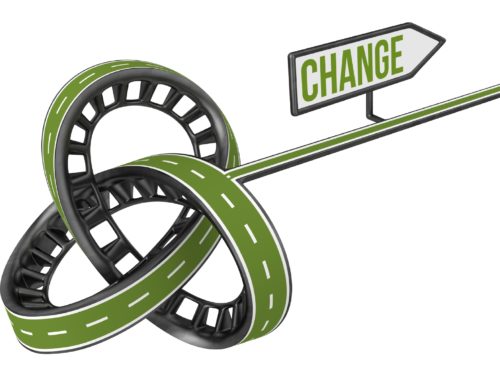Imagine wearing a large button with the words “Leader” and “Liar” written in opposite directions so that one of the words is always readable to others. How would those you wish to influence position that button on you? Would they say you are a leader or a liar?
The comparison might seem a little harsh. You may not be perfect, but your intentions are honorable, right?
Your answer, unfortunately, has nothing to do with your intent.
You know your intentions, but others look at your behavior and performance filtered through their lens of perception. When it comes to the decision to follow you – especially in times of disruption and change – perceptions are crucial.
Integrity, Trust, and Change
For many, the word integrity is synonymous with ethics. That is a critical piece of it, but true integrity also includes competence and consistency.
A building has integrity when it holds together and bears its own weight without failing or breaking apart. A process has integrity when it reliably delivers the same result over and over again.
The issues your organization faces – pressure on cost and profit margins, strategy execution, expanding partnerships, avoiding disruption, and continuous improvement – demand a work place that is fast, flexible, focused, and committed. Every person at every level must be trusted to deliver what they said they would do when they said they would do it the way it is supposed to be done.
That workplace doesn’t happen when integrity, in its fullest meaning, is questioned. Dr. Carl Frost said it well: “The degree and quality of employee participation, accountability, competence, and commitment are determined to a large extent by the presence of, absence of, or uncertainty about integrity.”
So You Want to Be a Leader
There is no five, seven, or 12-step program for harnessing the power of integrity. It is an on-going quest. Here are, however, three areas on which to focus today.
1.Tell yourself the truth.
3-D Vision – Denial, Distortion, and Delusion – blinds us to the need for change. We deny the truth, distort reality, and delude ourselves into thinking we are better than we are. Organizations and even entire industries do it. So do individuals. The cure is simple – the continuous search for and acknowledgement of truth and reality.
Talk openly and often about the importance of trust to remaining nimble and relevant in your marketplace. Most important, be honest about areas where you aren’t acting with complete integrity in your products, services, and relationships. Remember – truth is the victim when we value the allusion of success. Integrity-driven leaders and cultures focus on what is real.
2. Make better choices.
Many years ago, Dr. Harry Emerson Fosdick created a six-point test for deciding right from wrong that was later adapted by Dr. Preston Bradley. Here’s an updated version of those questions for today’s environment.
- Does your course of action seem logical, responsible, responsive, and legal?
- Would the results be beneficial for all if everyone made the same decision?
- Where will your plan of action lead? What are the potential unintended consequences? How will it affect others?
- Will you think well of yourself when you look back at what you’ve done … even if the results are not optimum?
- How would the person you most admire handle this situation? What would your hero do?
- What would friends, family, and those you admire think about your decision? How would you feel when it shows up on the front page of the newspaper?
3. Value relationships.
All great leaders create focus with clear goals and high expectations. They expect results, and they ensure effective execution of well-designed strategies. Integrity-driven leaders simply approach their leadership responsibilities from a different perspective.
Their power comes from trust rather than fear. They pay attention to relationships as well as results, and they stress credibility rather than control. As a result, they generate confidence from others instead of skepticism and cynicism.
You lead in a world where trust, confidence, and credibility are in short supply Followers are skeptical, and often cynical, about the motives behind the action of their leaders. Strong relationships earn you the benefit of the doubt when you ask someone to follow you into unknown territory.
Integrity is a crucial and often ignored element of sustaining a nimble organization that can flourish in any environment. It must be front and center in every discussion, decision, and action. It begins with answering this question: Are you a leader or a liar to those that you wish to influence?
Randy Pennington is an award-winning author,keynote speaker, and leading authority on helping organizations achieve positive results in a world of accelerating change. To bring Randy to your organization or event, visit www.penningtongroup.com , email info@penningtongroup.com, or call 972.980.9857.





